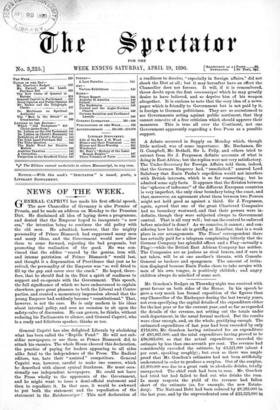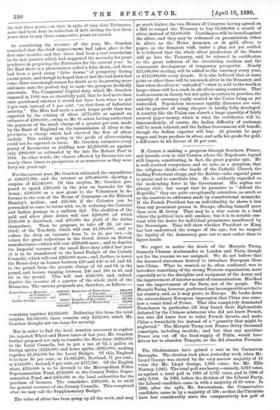Mr. Goschen's Budget on Thursday night was received with great
favour on both sides of the House. In his speech he gave a very much less formal exposition of the figures than any Chancellor of the Exchequer during the last twenty years, not even specifying the capital details of the expenditure either for the last year or for the current year, and so far as regarded the details of the revenue, not setting out the totals under each department, in the usual formal method. But the results were clear enough, and, on the whole, gratifying enough. The estimated expenditure of last year had been exceeded by only £116,000, Mr. Goschen having estimated for an expenditure of 285,967,000, and the total expenditure having proved to be £86,083,000, so that the actual expenditure exceeded the estimate by less than one-seventh per cent. The revenue had considerably exceeded the estimate, by £3,221,000 (about 4 per cent., speaking roughly) ; but even so there was ample proof that Mr. Goschen's estimates had not been artificially understated in order to produce a surplus. Out of the surplus, 21,800,000 was due to a great rush to alcoholic drinks, totally unexpected. The chief rush had been to rum. Mr. Goschen had tried but had failed to find out who drinks the rum. In many respects the yield of the revenue had fallen short of the estimate (as, for example, the new Estate. duty). The National Debt had been reduced by 28,283,000 in the last year, and by the unprecedented sum of £23,323,900 lu the last three years,—so that, in spite of very close Estimates, more had been done in reduction of debt during the last three years than in any three consecutive years on record.



















































 Previous page
Previous page